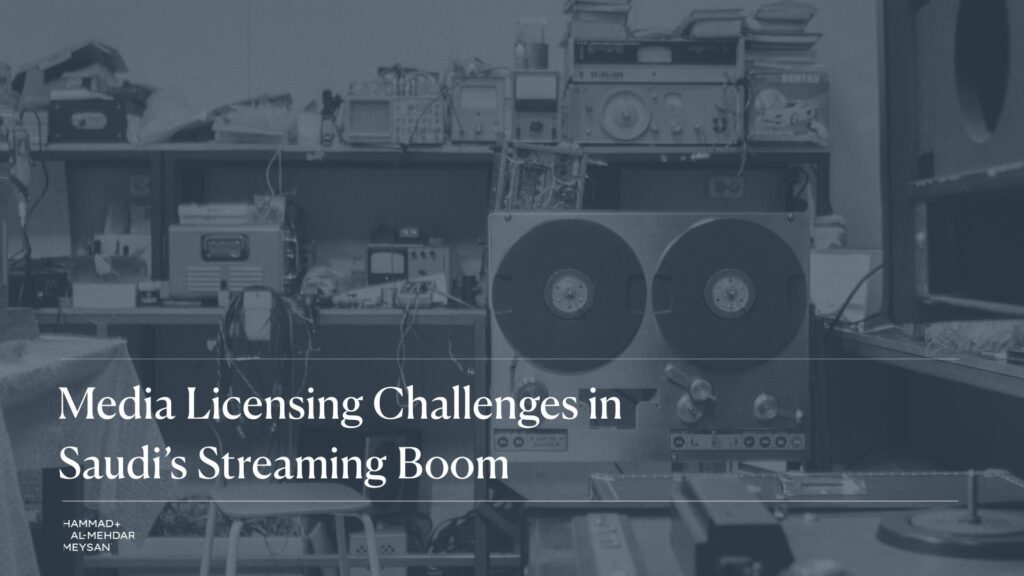
Saudi Arabia’s media landscape is undergoing a significant transformation, driven by the rapid expansion of streaming platforms and a concerted effort to diversify the economy under Vision 2030. However, this burgeoning sector faces a complex regulatory environment that presents unique challenges for both local and international content providers.
Regulatory Framework for Streaming Services
The cornerstone of Saudi Arabia’s media regulation is the Audiovisual Media Law (Royal Decree No. M/33, 2017), which mandates that all entities engaging in audiovisual media activities, ranging from satellite broadcasting to over-the-top (OTT) services, obtain the appropriate licences. This includes platforms offering video-on-demand (VOD), IPTV, and streaming services, whether they operate on a subscription, pay-per-view, or ad-supported model. The law aims to ensure that media content aligns with the Kingdom’s legal, cultural, and religious standards.
In addition to the Audiovisual Media Law, the Communications, Space and Technology Commission (CST) introduced regulations for digital content platforms in October 2024. These regulations require both local and international streaming services to register with the CST, appoint a local representative, and adhere to content and operational standards.
Licensing Procedures and Requirements
Navigating the licensing process in Saudi Arabia involves several steps. Entities must first secure an investment licence from the Ministry of Investment (MISA), particularly for foreign-owned firms, which typically requires establishing a limited liability company. Subsequently, a media licence must be obtained from the General Authority for Media Regulation (GAMR), which oversees the compliance of media content with national standards.
The licensing process is thorough, involving scrutiny of content offerings, business operations, and adherence to cultural norms. Platforms must demonstrate their commitment to producing or distributing content that aligns with Saudi values, which may necessitate content modifications or the development of region-specific programming.
Content Restrictions and Censorship
One of the most significant challenges for streaming services in Saudi Arabia is the stringent content regulations. The Kingdom enforces strict guidelines that prohibit content deemed offensive to Islamic teachings or contrary to public morals. This includes restrictions on nudity, LGBTQ+ themes, excessive violence, and content that may be considered politically sensitive or critical of the government.
As a result, international streaming platforms often face pressure to alter or censor their content to comply with these regulations. This can lead to challenges in maintaining the integrity of original programming while meeting regulatory requirements. Platforms must navigate these restrictions carefully to avoid penalties and ensure continued access to the Saudi market.
Compliance Costs and Administrative Burdens
The regulatory landscape in Saudi Arabia imposes significant administrative and financial burdens on streaming services. Compliance with licensing requirements involves not only the payment of application and annual fees but also the appointment of a local representative and adherence to regular financial reporting obligations.
For smaller or emerging platforms, these costs can be prohibitive, potentially limiting their ability to enter or sustain operations within the Saudi market. The administrative complexity further complicates the process, requiring a thorough understanding of local laws and regulations to navigate successfully.
Enforcement and Intellectual Property Concerns
While Saudi Arabia has made strides in regulating its media sector, challenges remain in enforcing intellectual property rights. The Kingdom has faced criticism for its handling of piracy issues, particularly concerning the illegal streaming service BeoutQ, which has been accused of broadcasting premium content without authorisation.
These enforcement challenges undermine the efforts of legitimate streaming services and create an uneven playing field. Intellectual property violations not only affect revenue streams but also damage the reputation of the Saudi media market.
Saudi Arabia’s streaming industry presents significant opportunities for growth and investment, driven by a young, tech-savvy population and a government committed to diversifying the economy. However, the complex regulatory environment poses substantial challenges for streaming services seeking to operate within the Kingdom.
To succeed, platforms must navigate a multifaceted licensing process, adhere to strict content regulations, manage compliance costs, and address intellectual property concerns. Understanding and adapting to these challenges is crucial for any entity looking to establish a presence in Saudi Arabia’s dynamic media landscape.
